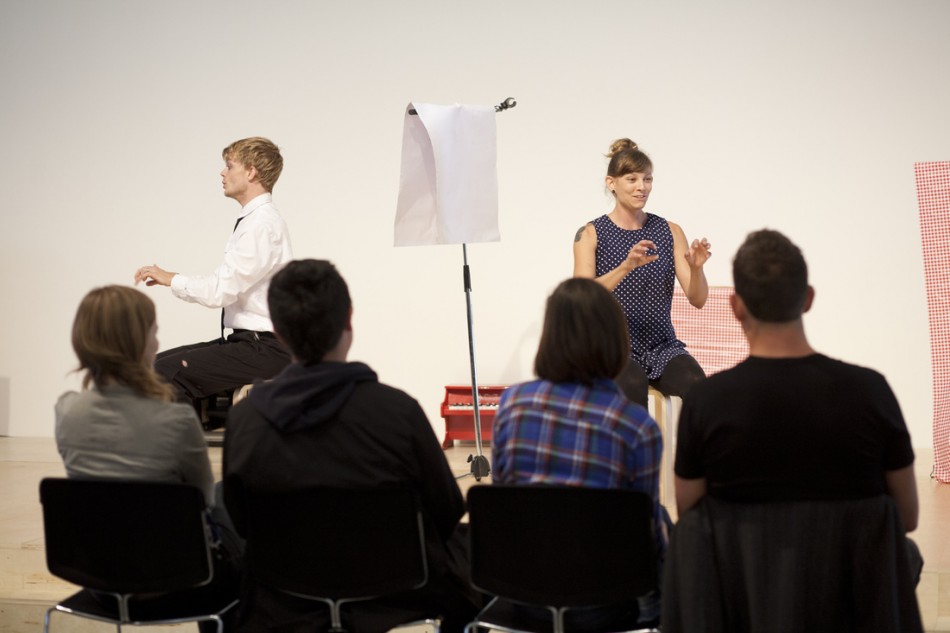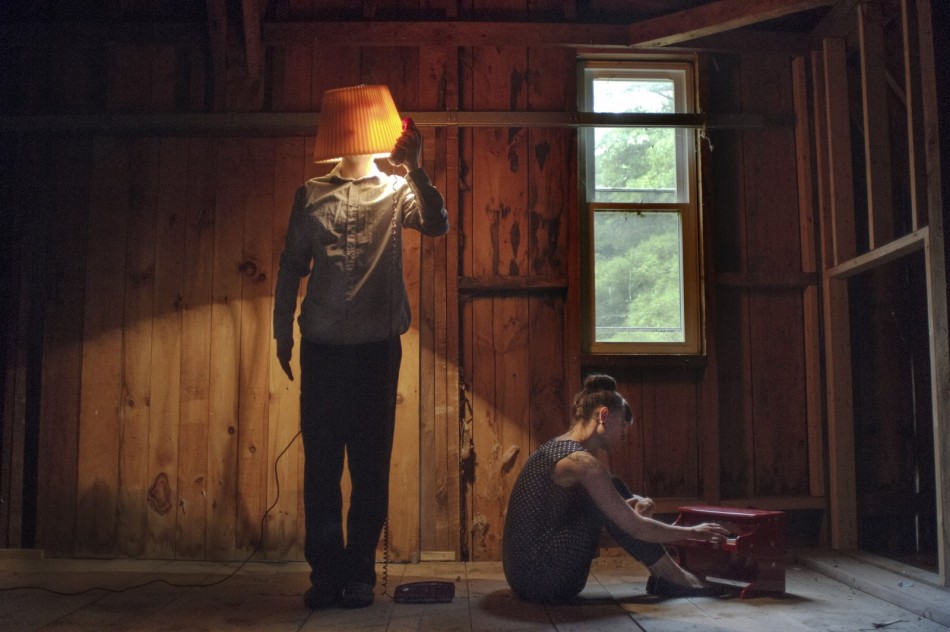
Scene from September
Wistful “September,” Odd Strangeways at Revolutions Theater Festival
Try to remember the kind of September when life was slow, and oh so mellow.
I kept thinking of those wistful lyrics as I watched, as part of the opening weekend of the Revolutions International Theater Festival in Albuquerque, Laurel Butler and Ewen Wright’s show “September,” a smart, moving and incredibly funny series of vignettes steeped in the absurdities of technology and what it has wrought upon our relationships.
The two moved from Albuquerque in 2011 to San Francisco, where they found endless fodder for a show that explores our increasing isolation in the midst of technology designed to connect us. Throw in some Arcade Fire on a miniature piano, classic rock, dance, masking, clever props and costuming, and it’s a witty and insightful ride.
The couple begin as two senior citizens — one whittling and one pickling — and reminiscing in the not-too-distant future about the good old days before the internet.
We all shared things at the same time.
Comics in the paper, delivered by a person in the morning.
Letters.
Phones on the wall.
The fine art of doing nothing in particular. Moments of being.
We had solitude and togetherness and all of a sudden new stuff put us somewhere in between. You look at your phone and look up and forget who you were five minutes ago.
The other half started making pickles and fighting corporations by knitting.
We follow their “mediatized memory,” as Butler says on her website. They meet, working side-by-side in cubicles, surrounded by the sounds of computers, email, texts and phones, yet desperate for human contact and a glimpse of the person on the other side of the wall.
Scenes are interspersed with witty wordplay.
I watched you forget how and when to eat.
I was so upset, I began to Tweet.
During one scene, Butler and Wright dissect the evening they just spent with another couple, and lambast their avoidance of emotional intimacy through incessant use of technology — and then proceed to bring up different examples on their ubiquitous phones that illustrate their points (including this one from comic Louis CK.)
The pair talk over one another and promise to post, text or email relevant links.
I squirmed a bit as I thought how many times have my husband and I have done some variation of this dance.
A particularly inspired sequence involves inflatable business suits and sprinting through a ditty about the grind of 9 to 5, before dancing wildly through the Kinks’ poignant song, “Shangri-La.”
We come back to the elderly couple in the end, dancing, until the phones interrupt. They place the devices on top of one another to commune as they wander off.
Butler and Wright call “September” an “optimistic speculation on the future of nostalgia.” It tries to create a space where authentic human interaction will win out over the machines. Whether that will be successful remains ambiguous by the end.
Revolutions exists to bring some of the most innovative and unusual international theater to Albuquerque. The festival also marks a time for Tricklock to showcase its own works in progress and get audience feedback.
One such piece, “Strangeways,” was inspired by an Outside magazine article on South African kayaker Hendrik Coetzee, consumed by a giant crocodile while navigating the Lukuga River in the Democratic Republic of Congo.
The group of performers went to Uganda in 2013 as part of the creative process. What has emerged, in the workshopped piece as seen so far, is a contemplation on the choices we make and the collateral damage to those around us.
“My taste for life had expanded,” says Alex Knight, playing Coetzee. “I had to prove to myself we can do things bigger than ourselves.”
His girlfriend left behind, played by Hannah Kauffman, tries to comfort herself with the idea that they had love between them, and maybe that was enough.
But she adds: “I don’t think that’s a word you know – enough.”
Frank Green, evoking a primordial being unchanged for thousands of years, is particularly effective as the crocodile.
Green is the only person of color in this ensemble. During the talkback, he was quick to explain that was not why he was cast as the crocodile devouring the white man in Africa. He actively sought the role after he researched the history of the reptile and its mythic power throughout numerous civilizations.
His performance confers gravitas.
We feel what folly it is for an outsider, an explorer, perhaps a new incarnation of white colonialist, to try to best nature in a place like the Congo. Yet Coetzee’s death is a result not just of nature’s brute force, but also of the impact of humans on the natural world. One of the stories Tricklock members heard on their trip is that the already aggressive crocodiles have now developed a heightened taste for human flesh, thanks in part to civil wars in the DRC and Rwanda that saw hundreds of bodies dumped into rivers.
(Revolutions runs through January 31. For tickets or information, visit this link.)


Butler and Wright perform September at Revolutions Theater Festival
